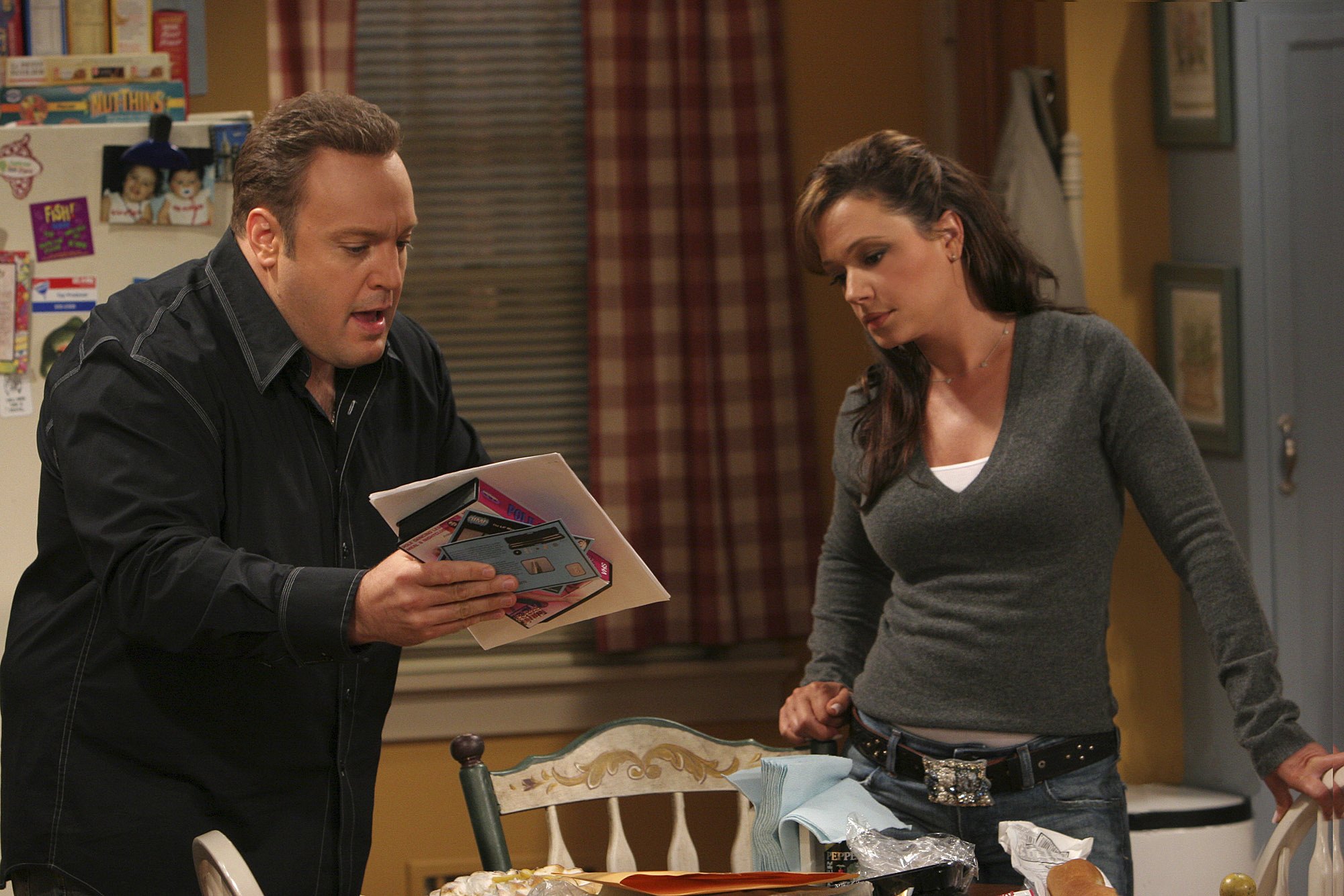Is "King Of Queens" A Spin-Off? Uncovering The Truth
"Is King of Queens a Spin-off?" is a question that often arises among fans of sitcoms. In the world of television, a spin-off is a television series that is created as an extension of an already existing program. The concept of a spin-off allows creators to explore new characters and storylines while maintaining a connection to the original show's universe. A notable example of a successful spin-off is the sitcom Friends, which spawned two spin-offs: Joey and Friends with Benefits.
Spin-offs offer several benefits to both networks and audiences. They can help to expand a franchise and introduce new characters and storylines that may not have fit into the original show's format. Additionally, spin-offs can serve as a way to keep a successful show's legacy alive, even after the original series has ended.
Historically, spin-offs have been around for several decades, with one of the earliest examples being The Andy Griffith Show, which spawned several spin-offs including Mayberry R.F.D. and Gomer Pyle, U.S.M.C. Today, spin-offs remain a popular way to expand the reach of successful television shows and create new content for audiences.
Is King of Queens a Spin-off?
When considering the question "Is King of Queens a spin-off?", several key aspects come into play. These aspects, which include the show's premise, characters, and relationship to other shows, provide a comprehensive understanding of the topic.
- Premise: Everyday life of a working-class couple in Queens, New York.
- Characters: Doug Heffernan (Kevin James), Carrie Heffernan (Leah Remini), Arthur Spooner (Jerry Stiller), Spence Olchin (Patton Oswalt).
- Relationship to other shows: The King of Queens is not a spin-off of any other show.
- Genre: Sitcom
- Network: CBS
- Original run: 1998-2007
- Number of seasons: 9
- Number of episodes: 207
- Spin-offs: None
These key aspects provide a comprehensive understanding of the show "King of Queens" and its relationship to other shows. The show's unique premise, memorable characters, and lack of connection to other shows make it a standalone sitcom that has entertained audiences for many years.
Premise
The premise of "King of Queens" is central to its status as a standalone sitcom. The show's focus on the everyday lives of Doug and Carrie Heffernan, a working-class couple living in Queens, New York, sets it apart from other sitcoms that may explore more fantastical or exaggerated storylines.
The relatable nature of the show's premise has contributed to its success. Audiences can connect with the characters and their experiences, as they navigate the challenges and joys of everyday life. The show's humor is derived from the characters' interactions and their often-misguided attempts to improve their lives. The focus on everyday life also allows the show to explore social and cultural issues in a realistic and accessible way.
The premise of "King of Queens" has also influenced the show's casting and writing. The actors who portray Doug and Carrie Heffernan, Kevin James and Leah Remini, are both known for their comedic talents and their ability to connect with audiences. The show's writers have created a series of well-developed characters and storylines that resonate with viewers.
The success of "King of Queens" demonstrates the power of a relatable premise. By focusing on the everyday lives of working-class people, the show has created a series that is both entertaining and heartwarming.
Characters
The characters in "King of Queens" play a crucial role in establishing the show's unique identity and distinguishing it from other sitcoms. The ensemble cast, led by Kevin James, Leah Remini, Jerry Stiller, and Patton Oswalt, brings depth and relatability to their roles, contributing to the show's overall success.
- Character Development: The characters in "King of Queens" undergo significant growth and development throughout the show's nine seasons. They learn to navigate the complexities of marriage, family, and friendship, and their relationships with each other deepen and evolve.
- Comedic Timing: The cast of "King of Queens" is known for their impeccable comedic timing. They deliver jokes with precision and wit, creating a consistently funny and entertaining show. The characters' interactions are often filled with physical comedy and slapstick humor, which adds to the show's overall appeal.
- Relatability: The characters in "King of Queens" are relatable and down-to-earth. They face everyday challenges and make mistakes, just like real people. This relatability helps audiences connect with the characters and invest in their stories.
- Ensemble Chemistry: The cast of "King of Queens" has excellent chemistry on-screen. They work together seamlessly and their camaraderie is evident in every episode. This chemistry contributes to the show's warm and inviting atmosphere.
The characters in "King of Queens" are not only well-developed and funny, but they also play a vital role in distinguishing the show from other sitcoms. Their unique personalities, relationships, and experiences make "King of Queens" a memorable and beloved show.
Relationship to other shows
The relationship between "Relationship to other shows: The King of Queens is not a spin-off of any other show." and "is king of queens a spin off" is significant. A spin-off is a television series that is created as an extension of an already existing program, sharing characters, storylines, or settings with the original show. However, "The King of Queens" does not fit this definition, as it was not created as an extension of any other show.
This distinction is important because it affects the way the show is perceived and marketed. Spin-offs often benefit from the popularity of the original show, attracting viewers who are already familiar with the characters and storylines. However, "The King of Queens" had to establish its own identity and audience, without the support of an existing franchise.
Despite not being a spin-off, "The King of Queens" has still achieved success. The show's relatable characters, humorous storylines, and talented cast have made it a popular and enduring sitcom. Its success demonstrates that it is possible to create a successful show without relying on the popularity of an existing franchise.
The understanding of the relationship between "Relationship to other shows: The King of Queens is not a spin-off of any other show." and "is king of queens a spin off" has practical applications in the television industry. It helps producers and network executives understand the different factors that contribute to the success of a show, and it can inform decisions about how to market and promote new shows.
Genre
The genre of "sitcom," short for "situational comedy," is central to the identity of "King of Queens" and distinguishes it from other types of television shows. Sitcoms typically feature a group of characters who interact in a comedic setting, often exploring everyday situations and relationships.
- Character-Driven Humor: Sitcoms rely heavily on the interactions and relationships between their characters. The humor in "King of Queens" stems from the characters' personalities, quirks, and relationships with each other.
- Episodic Structure: Sitcoms typically follow an episodic structure, with each episode focusing on a specific storyline or situation. This structure allows for a variety of comedic scenarios and character development.
- Relatable Situations: Sitcoms often explore relatable situations and experiences, making them appealing to a wide audience. "King of Queens" tackles themes such as marriage, family, and friendship, which resonate with viewers.
- Laugh Tracks: Many sitcoms, including "King of Queens," use laugh tracks to enhance the comedic effect. Laugh tracks provide a sense of communal laughter and help guide the audience's response.
These elements of the sitcom genre contribute to the success and appeal of "King of Queens." The show's relatable characters, humorous storylines, and episodic structure make it an enjoyable and entertaining watch for audiences.
Network
The network on which a television show airs can have a significant impact on its success and identity. In the case of "King of Queens," its association with CBS played a crucial role in shaping the show's development and perception.
- Established Platform: CBS is one of the oldest and most well-established television networks in the United States. Its long history and reputation for producing high-quality programming provided a solid foundation for "King of Queens" to build upon.
- Target Audience: CBS has a broad target audience, which includes families and older viewers. This demographic alignment with the show's intended audience helped to ensure its success.
- Programming Strategy: CBS's programming strategy has traditionally focused on sitcoms and procedurals, genres that "King of Queens" fits into. The network's commitment to these genres provided a supportive environment for the show to thrive.
- Marketing and Promotion: CBS has a strong marketing and promotion team that helped to raise awareness of "King of Queens" and attract viewers. The network's promotional efforts played a significant role in the show's success.
In conclusion, the network affiliation of "King of Queens" with CBS was a key factor in its success. CBS's established platform, target audience, programming strategy, and marketing prowess all contributed to the show's longevity and popularity.
Original run
The original run of "King of Queens" from 1998 to 2007 holds considerable significance in determining whether it is a spin-off or a standalone sitcom. Several key factors emerge from this time frame that shed light on the show's origins and relationship to other programs.
- Network Affiliation: "King of Queens" aired exclusively on CBS throughout its nine-season run. This network affiliation suggests that the show was not conceived as a spin-off of any other CBS program, as spin-offs typically share the same network as their parent shows.
- Stand-Alone Storylines: The storylines and characters in "King of Queens" are unique and do not rely on or reference any existing television series. This independence in storytelling further supports the notion that the show is not a spin-off.
- Character Development: The characters in "King of Queens" undergo significant growth and development over the course of its nine seasons. This character development is consistent with the trajectory of a standalone sitcom, rather than a spin-off, which would typically introduce new characters or focus on the development of characters from the parent show.
- Time Gap: "King of Queens" premiered in 1998, several years after the peak popularity of sitcom spin-offs in the 1970s and 1980s. This time gap suggests that the show was not created as part of a larger trend of spin-offs.
In conclusion, the original run of "King of Queens" from 1998 to 2007 provides strong evidence that the show is not a spin-off. Its network affiliation, stand-alone storylines, character development, and timing all point to the conclusion that it is an independent sitcom.
Number of seasons
The number of seasons a television show runs can provide insights into whether it is a spin-off or a standalone sitcom. In the case of "King of Queens," its nine-season run is a significant factor in determining its status.
Spin-offs are typically created to capitalize on the popularity of an existing show and often have shorter runs. The fact that "King of Queens" ran for nine seasons suggests that it was not conceived as a spin-off but rather as a standalone sitcom with its own unique identity and audience.
The nine-season run of "King of Queens" allowed the show to develop its characters, storylines, and comedic style. The show's longevity is a testament to its quality and the enduring appeal of its characters and humor.
Understanding the relationship between the number of seasons a show runs and whether it is a spin-off can be useful for television executives, producers, and writers. By analyzing the success of shows like "King of Queens," they can make informed decisions about how to develop and market new sitcoms.
Number of episodes
The number of episodes a television show has can provide valuable insights into whether it is a spin-off or a standalone sitcom. In the case of "King of Queens," its 207 episodes is a significant factor in determining its status.
Spin-offs are typically created to capitalize on the popularity of an existing show and often have shorter runs. The fact that "King of Queens" produced 207 episodes suggests that it was not conceived as a spin-off but rather as a standalone sitcom with its own unique identity and audience.
The 207 episodes of "King of Queens" allowed the show to develop its characters, storylines, and comedic style. The show's longevity is a testament to its quality and the enduring appeal of its characters and humor.
Understanding the relationship between the number of episodes a show runs and whether it is a spin-off can be useful for television executives, producers, and writers. By analyzing the success of shows like "King of Queens," they can make informed decisions about how to develop and market new sitcoms.
Spin-offs
The absence of spin-offs associated with "King of Queens" is a crucial factor in establishing its identity as a standalone sitcom. Spin-offs, by definition, are television series that are created as an extension of an existing show, sharing characters, storylines, or settings. The fact that "King of Queens" has no spin-offs signifies that it was conceived and developed as an original and independent sitcom.
This distinction is significant because it highlights the unique creative vision behind "King of Queens." The show's creators were not relying on an existing franchise or characters to generate interest. Instead, they crafted a new and original concept that stood on its own merits. The success of "King of Queens" demonstrates that it is possible to create a successful sitcom without relying on the popularity of an existing show.
Understanding the connection between "Spin-offs: None" and "is king of queens a spin off" provides valuable insights for television executives, producers, and writers. It shows that it is possible to create successful sitcoms that are not tied to existing franchises. This understanding can encourage creativity and innovation in the development of new television shows.
In conclusion, the absence of spin-offs associated with "King of Queens" is a key indicator of its status as a standalone sitcom. This distinction highlights the unique creative vision behind the show and demonstrates that it is possible to create successful sitcoms without relying on existing franchises.
In summary, our exploration of "is king of queens a spin off" has revealed several key insights. Firstly, the show's unique premise, characters, and lack of connection to other shows establish it as a standalone sitcom. Secondly, its extended run of nine seasons and 207 episodes further solidifies its independent status. Finally, the absence of any spin-offs associated with "King of Queens" reinforces its identity as an original and self-contained sitcom.
These key points collectively demonstrate that "King of Queens" is not a spin-off but rather a standalone sitcom with its own unique identity and audience. This understanding highlights the creative vision behind the show and the possibility of creating successful sitcoms without relying on existing franchises. As we continue to explore the world of television sitcoms, it is important to recognize and appreciate the significance of original and standalone shows like "King of Queens." Their ability to entertain, engage, and resonate with audiences is a testament to the creativity and innovation that drives the television industry.
Blake Griffin Kids: Raising Future Champions
How Nick Sirianni's Brotherly Bond Fuels His Coaching Success
Chad Kroeger Nickelback



ncG1vNJzZmiokaOyr36NmqSsa16Ztqi105qjqJuVlru0vMCcnKxmk6S6cLXSZqKippdivKd50K6cnqajYq5uv8%2BipWanlpt7qcDMpQ%3D%3D